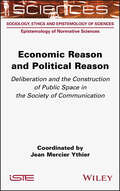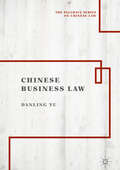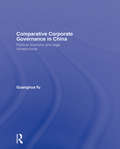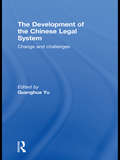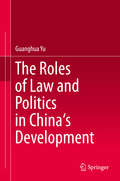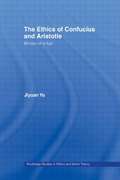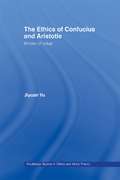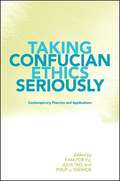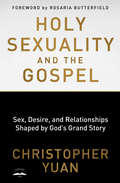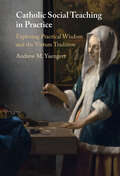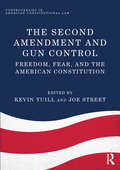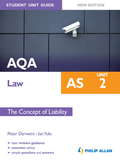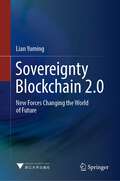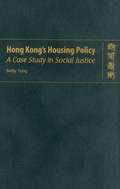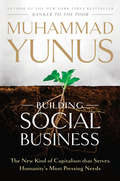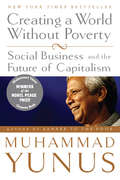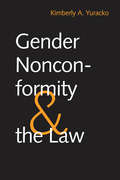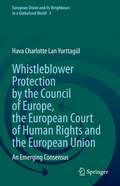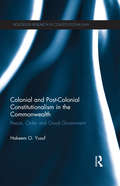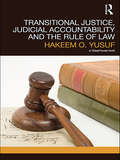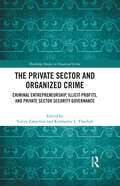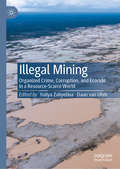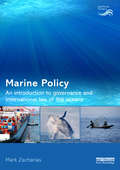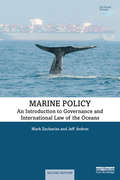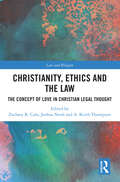- Table View
- List View
Economic Reason and Political Reason: Deliberation and the Construction of Public Space in the Society of Communication
by Jean Mercier YthierThe public space of democracies is constructed in a context that is marked by the digital transformation of the economy and society. This construction is carried out primarily through deliberation. Deliberation informs and guides both individual and collective action. <p><p> To shed light on the concept of deliberation, it is important to consider the rationality of choice; but what type of rationality is this? References to economic reason are at once widespread, crucial and controversial. This book therefore deals with arguments used by individuals based on the notions of preferential choice and rational behavior, and also criticizes them. These arguments are examined in the context of the major themes of public debate that help to construct the contemporary public space: "populism", social insurance, social responsibility and environmental issues. <p><p> Economic Reason and Political Reason underlines the importance of the pragmatist shift of the 2000s and revisits, through the lens of this new approach, the great utilitarian and Rawlsian normative constructs that dominated normative political economics at the end of the 20th century. Alternative approaches, based on the concept of deliberative democracy, are proposed and discussed.
Chinese Business Law (The Palgrave Series on Chinese Law)
by Danling YuThis book offers the first definitive English-language resource on Chinese business law. Written by an authoritative source, the book accurately describes what the business law is and explains legislative intentions underlying the myriad of law, rules, and regulations. Moreover, it provides the most up-to-date information on law, rules, and regulations and contains accurate predictions of the future legislative trend. It is written for readers across the spectrum of both common law and civil law systems. The author’s experience as expert counsel to Chinese central governmental legislative functions including the State Council Legislative Affairs Office and the expert editor and translator in chief of the national administrative regulations in business and finance, extensive experience of international legal practice and arbitration, and teaching and research experience in international business law and Chinese law will make this book of interest to lawyers, business people, and scholars.
Comparative Corporate Governance in China: Political Economy and Legal Infrastructure
by Guanghua YuAn insightful overview of the political, legal and social perspectives which inform corporate governance in China, this book examines the challenges of corporate governance faced by Chinese corporations and international corporations operating in China. Unlike other texts that tend to focus solely on the board of directors and the takeover market, Yu has enlarged the scope of this study to cover both market forces and contractual mechanisms, providing readers with an extended and comprehensive discussion of the pertinent issues. It explores a range of issues and their role in corporate governance models, including: executive compensation takeover markets the securities market insolvency issues venture capital market Examining the current climate and making the case that comparative corporate governance studies have significant policy implications for China’s transitional economy, Yu has put together a book that is a valuable resource for students and those working in Asian business, corporate governance and commercial law.
The Development of the Chinese Legal System: Change and Challenges
by Guanghua YuIn recent years the Chinese legal system has undergone many reforms and this book brings the literature up to date, offering a contemporary account of the law and administration in China. This book is the result of collective efforts in analysing the political, economic and social factors which affect the development of Chinese law. The volume contains contributions from a number of experts and scholars of Chinese law who examine some of the most important areas of Chinese law. The book covers constitutional law, criminal law, property law, mortgage law, intellectual property law, corporate law, securities regulation, banking regulation, civil procedural law, arbitration law, environmental law, and the regulation of telecommunications services. Whilst the book addresses a number of diverse legal areas all the contributions look to explain the factors which led to the development of the law and the consequences of such developments, as well as the progress made by developing legal institutions and the possible obstacles to future development.
The Roles of Law and Politics in China's Development
by Guanghua YuThis book examines China's economic development from the end of 1970s, integrating perspectives from law, economics and political science. Particular attention is given to the role of formal law and political changes in China's development, presenting the argument that formal law has made a useful contribution to China's economic development. Chapters explore the relationship between democracy and mechanisms of property rights protection, financial market, rule of law, and human capital accumulation. The author goes on to examine the persistence of authoritarianism, democracy and economic development and the concept of deliberative democracy. This book concludes with a look at future options for China, from political, economic and rule of law perspectives. The book considers China's current political regime and analyzes the likely political and constitutional law reforms that are not only conducive to China's economic development but also beneficial to the enhancement of freedom. Some knowledge of the Chinese legal system, economy, and political institutions is assumed, making this book valuable to those requiring a deeper understanding of the subject. The book will appeal to legal scholars and lawyers requiring an understanding of the impact of the Chinese legal system on China's economic and political development and to scholars and students in political science and economics with an interest in China's institutional change. Policy makers and administrators with an interest in policy and law making in China will also find this book valuable.
The Ethics of Confucius And Aristotle: Mirrors of Virtue
by Jiyuan YuFurthermore, this work focuses on singling out the most significant issues which not only are commonly exploited in these two ethics, but are also of great interest in contemporary virtue ethics. I first became interested in this subject in 1996 when Nicholas Bunnin invited me to speak at a conference on Chinese philosophy that he organized at Oxford University. By that time, Aristotle’s Nicomachean Ethics had been intensively studied as the most important model of virtue ethics for decades. As a student of Aristotle, when I turned my eyes to Chinese philosophy, the first thing I noticed is how similar the Confucian approach to ethics is to Aristotle’s in many aspects. Hence I chose to present a paper dealing with how Aristotle and Confucius conceive the conception of virtue. The paper was later published in the Philosophy East and West 48 (1998), with the title of ‘‘Virtue: Aristotle and Confucius.’’ It became the seed of this book.
The Ethics of Confucius and Aristotle: Mirrors of Virtue (Routledge Studies in Ethics and Moral Theory #7)
by Jiyuan YuAs a comparative study of the virtue ethics of Aristotle and Confucius, this book explores how they each reflect upon human good and virtue out of their respective cultural assumptions, conceptual frameworks, and philosophical perspectives. It does not simply take one side as a framework to understand the other; rather, it takes them as mirrors for each other and seeks to develop new readings and perspectives of both ethics that would be unattainable if each were studied on its own.
Taking Confucian Ethics Seriously: Contemporary Theories and Applications (Suny Series in Chinese Philosophy and Culture)
by Kam-Por Yu Philip J. Ivanhoe Julia TaoMany—though surely not all—people who have lived in Confucian societies have taken Confucian ethics seriously for hundreds of generations, but why should one study Confucian ethics today?
Holy Sexuality and the Gospel: Sex, Desire, and Relationships Shaped by God's Grand Story
by Christopher Yuan Rosaria ButterfieldFrom the author of Out of a Far Country, which details his dramatic conversion from an agnostic gay man who put his identity in his sexuality to a Bible professor who now puts his identity in Christ alone, comes a gospel-centered discussion of sex, desire, and relationships.Dr. Christopher Yuan explores the concept of holy sexuality--chastity in singleness or faithfulness in marriage--in a practical and relevant manner, equipping readers with an accessible yet robust theology of sexuality. Whether you want to share Christ with a loved one who identifies as gay or you're wrestling with questions of identity yourself, this book will help you better understand sexuality in light of God's grand story and realize that holy sexuality is actually good news for all.
Catholic Social Teaching in Practice: Exploring Practical Wisdom and the Virtues Tradition
by Andrew M. YuengertAlthough the virtues are implicit in Catholic Social Teaching, they are too often overlooked. In this pioneering study, Andrew M. Yuengert draws on the neo-Aristotelian virtues tradition to bring the virtue of practical wisdom into an explicit and wide-ranging engagement with the Church's social doctrine. Practical wisdom and the virtues clarify the meaning of Christian personalism, highlight the irreplaceable role of the laity in social reform, and bring attention to the important task of lay formation in virtue. This form of wisdom also offers new insights into the Church's dialogue with economics and the social sciences, and reframes practical political disagreements between popes, bishops, and the laity in a way that challenges both laypersons and episcopal leadership. Yuengert's study respects the Church's social tradition, while showing how it might develop to be more practical. By proposing active engagement with practical wisdom, he demonstrates how Catholic Social Teaching can more effectively inform and inspire practical social reform.
The Second Amendment and Gun Control: Freedom, Fear, and the American Constitution (Controversies in American Constitutional Law)
by Kevin Yuill Joe StreetThe Second Amendment, by far the most controversial amendment to the US Constitution, will soon celebrate its 225th anniversary. Yet, despite the amount of ink spilled over this controversy, the debate continues on into the 21st century. Initially written with a view towards protecting the nascent nation from more powerful enemies and preventing the tyranny experienced during the final years of British rule, the Second Amendment has since become central to discussions about the balance between security and freedom. It features in election contests and informs cultural discussions about race and gender. This book seeks to broaden the discussion. It situates discussion about gun controls within contemporary debates about citizenship, culture, philosophy and foreign policy as well as in the more familiar terrain of politics and history. It features experts on the Constitution as well as chapters discussing the symbolic importance of Annie Oakley, the role of firearms in race, and filmic representations of armed Hispanic girl gangs. It asks about the morality of gun controls and of not imposing them. The collection presents a balanced view between those who favour more gun controls and those who would prefer fewer of them. It is infused with the belief that through honest and open debate the often bitter cultural divide on the Second Amendment can be overcome and real progress made. It contains a diverse range of perspectives including, uniquely, a European perspective on this most American of issues.
AQA AS Law Student Unit Guide New Edition: Unit 2 The Concept of Liability
by Ian Yule Peter DarwentWritten by senior examiners, Ian Yule and Peter Darwent, this AQA AS Law Student Unit Guide is the essential study companion for Unit 2: The Concept of Liability.This full-colour book includes all you need to know to prepare for your unit exam: clear guidance on the content of the unit, with topic summaries, knowledge check questions and a quick-reference index examiner's advice throughout, so you will know what to expect in the exam and will be able to demonstrate the skills required exam-style questions, with graded student responses, so you can see clearly what is required to get a better grade
Sovereignty Blockchain 2.0: New Forces Changing the World of Future
by Lian YumingThis book is a continuation and deepening of Sovereign Blockchain 1.0. It mainly includes three views: 1) Blockchain is a super public product based on digital civilization. 2) The Internet is an advanced level of industrial civilization, the core of which is connection; blockchain is an important symbol of digital civilization, the essence of which is reconstruction. 3) Digital currency will trigger a comprehensive change in the economic field, and digital identity will reconstruct the governance model in the social field, thereby changing the order of civilization.This book is not only a popular science book based on blockchain thinking, theory and application research, but also a scholarly work on the technical and philosophical issues of governance and the future. By reading Sovereign Blockchain 2.0, policymakers can quickly understand the basic knowledge and frontier dynamics of science and technology; science and technology workers can grasp the general trend, seize opportunities, face problems and difficulties, aim at the world's science and technology frontier and lead the direction of science and technology development; experts and scholars in law and legal fields can see new ideas, concepts and models of data governance; social science researchers can discover data sociology and data philosophy issues.
Hong Kong's Housing Policy - A Case Study in Social Justice
by Betty YungThis book examines housing policy in Hong Kong using a new and unique interdisciplinary approach - combining the philosophical discussion on social justice with policy and housing studies. It considers both Western and Chinese concepts of social justice,a
Building Social Business: The New Kind of Capitalism That Serves Humanity's Most Pressing Needs
by Muhammad YunusMuhammad Yunus, the practical visionary who pioneered microcredit and, with his Grameen Bank, won the 2006 Nobel Peace Prize, has developed a visionary new dimension for capitalism which he calls "social business. ” By harnessing the energy of profit-making to the objective of fulfilling human needs, social business creates self-supporting, viable commercial enterprises that generate economic growth even as they produce goods and services that make the world a better place. In this book, Yunus shows how social business has gone from being a theory to an inspiring practice, adopted by leading corporations, entrepreneurs, and social activists across Asia, South America, Europe and the US. He demonstrates how social business transforms lives; offers practical guidance for those who want to create social businesses of their own; explains how public and corporate policies must adapt to make room for the social business model; and shows why social business holds the potential to redeem the failed promise of free-market enterprise.
Creating a World Without Poverty: Social Business and the Future of Capitalism
by Muhammad YunusIn this newly updated national bestseller, Nobel Peace Prize?winner Muhammad Yunus outlines his vision of a new business model that combines the power of free markets with the quest for a more humane world.
Gender Nonconformity and the Law
by Kimberly A. YurackoWhen the Civil Rights Act of 1964 was passed, its primary target was the outright exclusion of women from particular jobs. Over time, the Act's scope of protection has expanded to prevent not only discrimination based on sex but also discrimination based on expression of gender identity. Kimberly Yuracko uses specific court decisions to identify the varied principles that underlie this expansion. Filling a significant gap in law literature, this timely book clarifies an issue of increasing concern to scholars interested in gender issues and the law.
Whistleblower Protection by the Council of Europe, the European Court of Human Rights and the European Union: An Emerging Consensus (European Union and its Neighbours in a Globalized World #3)
by Hava Charlotte YurttagülFirst introduced in the United States, whistleblower laws have become increasingly popular around the world. This book illustrates the regional efforts undertaken by European organizations to promote whistleblower protection in Europe. To provide context, the first part of the book presents an overview of the international best practices for whistleblowing legislation and explores the status of whistleblower under international law. It also assesses the global hot topics regarding whistleblowing, from the cases of Edward Snowden and Julian Assange to the silencing of whistleblowers during the COVID-19 pandemic. The following parts focus on the European approach to whistleblower laws. It illustrates the influence of the Council of Europe in putting whistleblower protection on the European agenda and discusses the European Court of Human Rights’ case law on whistleblowing under Article 10 of the European Convention on Human Rights. In the final part, the author analyzes the evolution of the European Union’s approach to whistleblowing and the legal significance of the EU Whistleblower Directive adopted in 2019. In the respective parts, the author also examines the effectiveness of the international organizations’ own internal rules on whistleblowing, from the United Nations and the World Bank Group to the Council of Europe and the European Union.
Colonial and Post-colonial Constitutionalism in the Commonwealth: Peace, Order and Good Government (Routledge Research in Constitutional Law #7)
by Hakeem O. YusufThe peace, order and good government (POGG) clause is found in the constitutions of almost all Commonwealth countries. Since its introduction, the clause has played a significant role in colonial and post-colonial constitutionalism in Commonwealth jurisdictions.This book is the first full length analysis of the various dimensions of the peace, order and good government clause. It argues that the origins of the POGG clause mark it out as an anachronistic feature of British constitutionalism when seen against a modern setting of human rights, liberty and democratisation. The book traces the history, politics and applications of the clause through the colonial period in Commonwealth territories to date. It provides critical evaluation of the POGG clause in a cross-continental enquiry, examining statutory, political and constitutional deployment in Australia, Canada, India, Nigeria, South Africa and the United Kingdom. The evaluation demonstrates that the POGG clause has relevance in a number of significant aspects of legal and socio-political ordering across the Commonwealth featuring prominently in the federalism question, emergency powers and the review of administrative powers. It maintains that while the clause is not entirely devoid of positive value, the POGG clause has been used not only to further the objects of colonialism, but also authoritarianism and apartheid. This book calls for a rethink of the prevailing subjective approach to the interpretation of the clause. The book will be of interest to students and academics of public law, human rights law, and comparative politics.
Transitional Justice, Judicial Accountability and the Rule of Law
by Hakeem O. YusufTransitional Justice, Judicial Accountability and the Rule of Law addresses the importance of judicial accountability in transitional justice processes. Despite a general consensus that the judiciary plays an important role in contemporary governance, accountability for the judicial role in formerly authoritarian societies remains largely elided and under-researched. Hakeem O. Yusuf argues that the purview of transitional justice mechanisms should, as a matter of policy, be extended to scrutiny of the judicial role in the past. Through a critical comparative approach that cuts through the transitioning experiences of post-authoritarian and post-conflict polities in Latin America, Asia, Europe and Africa, the book focuses specifically on Nigeria. It demonstrates that public accountability of the judiciary through the mechanism of a truth-seeking process is a necessary component in securing comprehensive accountability for the judicial role in the past. Transitional Justice, Judicial Accountability and the Rule of Law further shows that an across-the-board transformation of state institutions – an important aspiration of transitional processes – is virtually impossible without incorporating the third branch of government, the judiciary, into the accountability process.
The Private Sector and Organized Crime: Criminal Entrepreneurship, Illicit Profits, and Private Sector Security Governance (Routledge Studies in Organised Crime)
by Yuliya ZabyelinaThis book contributes to the literature on organized crime by providing a detailed account of the various nuances of what happens when criminal organizations misuse or penetrate legitimate businesses. It advances the existing scholarship on attacks, infiltration, and capture of legal businesses by organized crime and sheds light on the important role the private sector can play to fight back. It considers a range of industries from bars and restaurants to labour-intensive enterprises such as construction and waste management, to sectors susceptible to illicit activities including transportation, wholesale and retail trade, and businesses controlled by fragmented legislation such as gambling. Organized criminal groups capitalize on legitimate businesses beleaguered by economic downturns, government regulations, natural disasters, societal conflict, and the COVID-19 pandemic. To survive, some private companies have even become the willing partners of criminal organizations. Thus, the relationships between licit businesses and organized crime are highly varied and can range from victimization of businesses to willing collusion and even exploitation of organized crime by the private sector – albeit with arrangements that typically allow plausible deniability. In other words, these relationships are highly diverse and create a complex reality which is the focus of the articles presented here. This book will appeal to students, academics, and policy practitioners with an interest in organized crime. It will also provide important supplementary reading for undergraduate and graduate courses on topics such as transnational security issues, transnational organized crime, international criminal justice, criminal finance, non-state actors, international affairs, comparative politics, and economics and business courses.
Illegal Mining: Organized Crime, Corruption, and Ecocide in a Resource-Scarce World
by Yuliya Zabyelina Daan Van UhmThis book provides a comprehensive analysis of the illegal extraction of metals and minerals from the perspectives of organized crime theory, green criminology, anti-corruption studies, and victimology. It includes contributions that focus on organized crime-related offences, such as drug trafficking and trafficking in persons, extortion, corruption and money laundering and sheds light on the serious environmental harms caused by illegal mining. Based on a wide range of case studies from the Amazon rainforest through the Ukrainian flatlands to the desert-like savanna of Central African Republic and Australia’s elevated plateaus, this book offers a unique insight into the illegal mining business and the complex relationship between organized crime, corruption, and ecocide. This is the first book-length publication on illegal extraction, trafficking in mined commodities, and ecocide associated with mining. It will appeal to scholars working on organized crime and green crime, including criminologists, sociologists, anthropologists, and legal scholars. Practitioners and the general public may welcome this comprehensive and timely publication to contemplate on resource-scarcity, security, and crime in a rapidly changing world.
Marine Policy: An Introduction to Governance and International Law of the Oceans
by Mark ZachariasThis textbook provides the reader with a foundation in policy development and analysis and describes how policy, including legal mechanisms, is applied to marine environments around the world. It offers a systematic treatment of all aspects of marine policy, including environmental protection, fisheries, transportation, energy, mining and climate change. It starts with a biophysical overview of the structure and function of the marine environment with a particular emphasis on the challenges and opportunities of managing the marine environment. An overview of the creation and function of international law is then provided with a focus on international marine law. It explores the geographic and jurisdictional dimensions of marine policy, as well the current and anticipated challenges facing marine systems, including climate change-related impacts and resource over-exploitation. The book should appeal to senior undergraduate and graduate students and form a core part of the curriculum for marine affairs, science and policy courses. It will also provide supplementary reading for students taking a course in the law of the oceans, but is not aimed at legal specialists.
Marine Policy: An Introduction to Governance and International Law of the Oceans (Earthscan Oceans)
by Mark Zacharias Jeff ArdronThis book provides readers with a foundation in policy development and analysis, describing how policy, including legal mechanisms, are applied to the marine environment. It presents a systematic treatment of all aspects of marine policy, including climate change, energy, environmental protection, fisheries, mining and transportation. The health of marine environments worldwide is steadily declining, and these trends have been widely reported. Marine Policy summarizes the importance of the ocean governance nexus, discussing current and anticipated challenges facing marine ecosystems, human activities, and efforts to address these threats. This new, fully revised edition has been updated throughout, including content to reflect the recent advances in ocean management and international law. Chapters on shipping, energy/mining and integrated approaches to ocean management have been significantly reworked, plus completely new chapters on the United Nations Convention on the Law of the Sea, and the impacts of climate change have been added. Pedagogical features for students are included throughout. Aligned with current course offerings, this book is an ideal introduction for undergraduates and graduate students taking marine affairs, science and policy courses.
Christianity, Ethics and the Law: The Concept of Love in Christian Legal Thought (Law and Religion)
by Zachary R. Calo, Joshua Neoh and A. Keith ThompsonThis book examines how Christian love can inform legal thought. The work introduces love as a way to advance the emergent conversation between constructive theology and jurisprudence that will also inform conversations in philosophy and political theory. Love is the central category for Christian ethical understanding. Yet, the growing field of law and religion, and relatedly law and theology, rarely address how love can shape our understanding of law. This reflects, in part, a common assumption that law and love stand in necessary tension. Love applies to the private and the personal. Law, by contrast, applies to the public and the political, realms governed by power. It is thus a mistake to envisage love as having anything but a negative relationship to law. This conclusion continues to govern Christian understandings of the meaning and vocation of law. The animating idea of this volume is that the concept of love can and should inform Christian legal thought. The project approaches this task from the perspective of both historical and constructive theology. Various contributions examine how such thinkers as Augustine, Aquinas, and Calvin utilised love in their legal thought. These essays highlight often neglected aspects of the Christian tradition. Other contributions examine Christian love in light of contemporary legal topics including civility, forgiveness, and secularism. Love, the book proposes, not only matters for law but can transform the terms on which Christians understand and engage it.? The book will be of interest to academics and researchers working in the areas of legal theory; law and religion; law and philosophy; legal history; theology and religious studies; and political theory.
